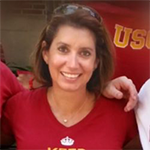Q&A For The Day
I was recently interviewed by a 9th grade biology student working on an assignment and some of the questions he asked reminded me of the numerous discussions regarding CA NGSS implementation I have had over the last few years.
Question 1: What is science?
I could have given him a very refined answer, but I didn’t want the eye roll at the dinner table. Instead, I told him that science was simply studying the world around us and all that we know because of it. I had so much more to say about science being both the process and the knowledge obtained through the process or how everything he actually enjoys is a result of science, but being 15 and much more interested in getting the interview over with so he could get back to his Virtual Reality headset, he didn’t ask me to elaborate. Lesson learned.
Question 2: Why do you like science?
Simple. I enjoy projects and trying to figure stuff out. Every science question I have leads to answers (not always to the question being asked), which leads to more questions. It is this never ending cycle of projects. There is what you know, what you don’t know, and what you don’t even know you don’t know. I love that moment when you discover something new you don’t know. Science gives me a plethora of opportunities for this. He was baffled by my answer because he is my teenager and most definitely already knows everything, so he can’t fathom that someone doesn’t know they don’t know something.
Question 3: Which science is your favorite?
This one was easy...whatever I am studying that relates to the human body or genetics. I was just about to expand on this when he said: “Oh yeah, you like biology.” I had my opening and told him that was not what I said. I told him that I have favorite topics; I do not have a favorite science. My favorite science is just science. You can even throw engineering into the mix.
Question 4: Which one (science) is the most important?
This one made me smile and gave me flashbacks to CA NGSS implementation. I took him outside to our current nightmare of a backyard and simply told him that the most important science was the one that would have prevented the current mud pit that is pretending to be a functional yard and the one that will fix it for me. Annoyed that I didn’t give him an actual answer, he asked which one that is. I was not going to let him off the hook that easily and asked him what he thought. Looking around, he quickly guessed Earth science. Nope! Biology? Wrong! Physics? No! Chemistry? I just shook my head. To him, I just said no to all of the sciences and he mentioned as much. In my mind, that is not what I did at all. I told him that to me, the most important science is simply SCIENCE; it is the interactions between all of the silos we have created, not the silos themselves. The slope behind the backyard mud pit used to be covered with pine trees, but the previous owner didn’t want trees to fall on the house so had them all cut down. I don’t even want to try to calculate how much water those trees absorbed on a regular basis. Had this person understood biology as it relates to plants, their needs, and photosynthesis all of that water would have been taken into consideration. Wait a minute, photosynthesis. There is all sorts of chemistry going on there. Maybe they should have paid attention in that class. Now, all of that extra water not being absorbed by trees had to go somewhere, This is one of the places that Earth science comes into play. Erosion! Maybe they should have taken that science class. Not only does a lot of rain cause this slope to erode and the retaining walls to collapse, there is so much water at the end of the slope that plants won’t grow, leaving a muddy mess. A basic understanding of physics would have led to questions about drainage and structural integrity of the wall. I know I missed a multitude of interactions that could have been mentioned, but he started to get the point. Fortunately, I have a plan that involves my understanding of science and my willingness to consult the experts to fix the problem.
Reflecting after the interview, I can honestly say that my work on the CA Science Framework committee and my time with CASE has changed my perspective and definitely altered what my answers would have been ten years ago. Having a community of science educators sharing their passion for their niche of science and collaborating with one another to not only instill this passion in the next generation, but to also ensure that all students have the opportunity to experience high quality science education, has shown me that we are very similar to the silos we have created. We are much more powerful and impactful when we interact and collaborate.





